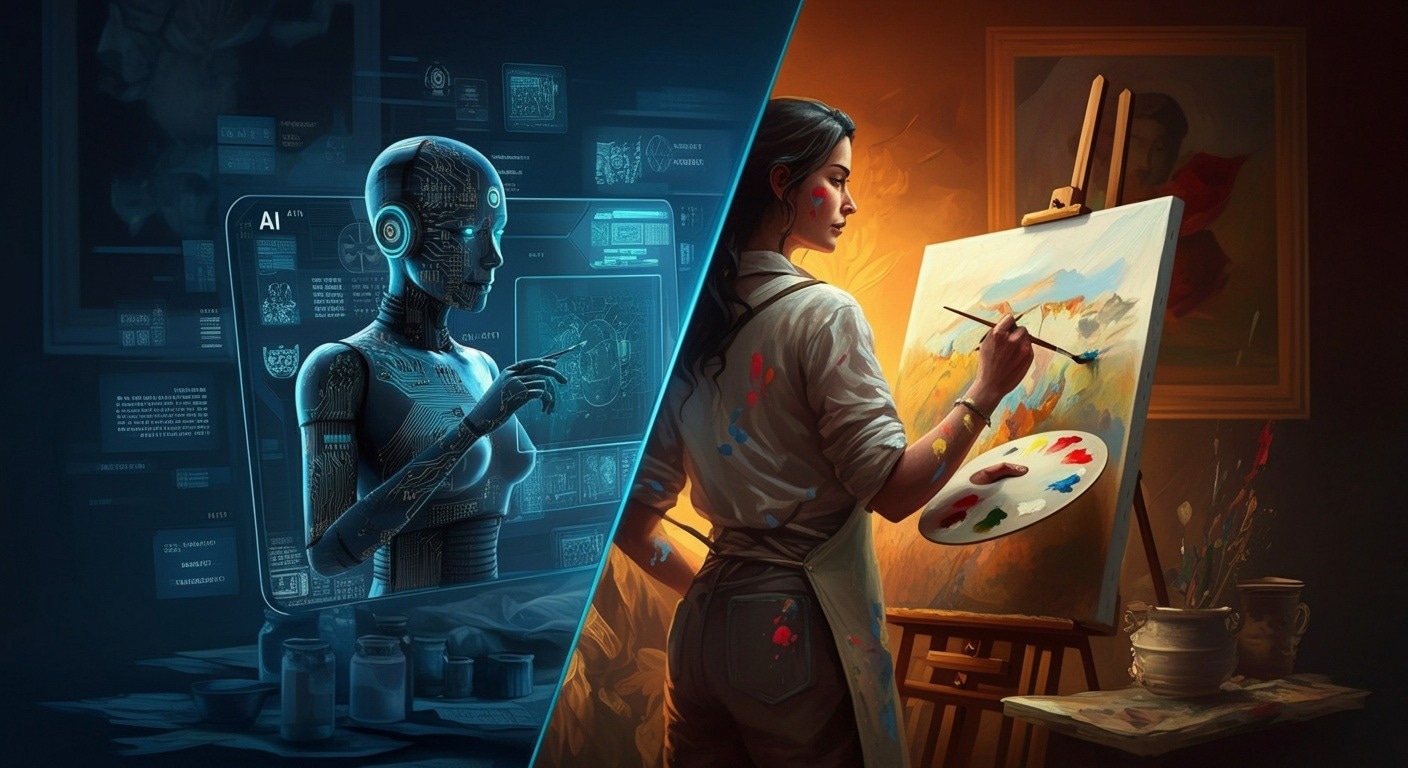AI in Entertainment: 5 Key Impacts on Creativity (2023 Analysis)
Explore AI's impact on entertainment and discover why human creativity remains irreplaceable in the age of algorithms.

AI’s Growing Role in Entertainment: Threat to Some Content, But True Artistry Endures
Netflix co-CEO Ted Sarandos recently highlighted a paradox facing the entertainment industry: while artificial intelligence (AI) is rapidly transforming content creation—potentially threatening some types of programming—exceptional artists like Taylor Swift remain “more popular than ever,” proving that “it takes a great artist to make something great.” This contrast underscores a critical debate: as AI tools become more sophisticated, which forms of content are truly at risk, and where does human creativity still reign supreme?
The AI Threat to “Easy-to-Watch” Content
AI’s capabilities in generating scripts, visual effects, and even entire scenes are advancing at a remarkable pace. Industry analysts now warn that “Netflix’s core lay-back easy-to-watch scripted content is potentially most at risk by the emergence of generative AI compared to peers,” according to John Conca, an analyst with investment research firm Third Bridge. The reasoning is clear: formulaic, mass-produced shows—think procedurals, sitcoms, and light dramas—are easier for AI to replicate, potentially flooding the market with AI-generated alternatives that could undercut traditional production pipelines.
Netflix itself is embracing AI to improve recommendation algorithms and content discovery, and some creators are already using generative AI and volumetric capture to de-age actors or enhance visual effects. This trend is not unique to Netflix; Lionsgate, for example, had ambitious plans to leverage AI for “capital efficient content creation,” though these efforts have reportedly struggled to deliver on their promise. Meanwhile, reports suggest that as many as 130,000 scripts may have been used without permission to train AI models, raising ethical and legal questions about the sourcing of creative material.
The Limits of AI in Creative Industries
Despite these advances, there are clear limits to what AI can achieve—especially when it comes to the kind of artistry that defines cultural icons. Taylor Swift’s enduring popularity, cited by Sarandos, is a case in point. Her success is built not just on catchy melodies, but on a deeply personal connection with audiences, a distinctive voice, and a cultural footprint that no algorithm can replicate. This distinction is critical: while AI may excel at generating content that fits established formulas, it struggles to produce the originality, emotional depth, and cultural resonance that define true artistic breakthroughs.
Industry leaders are beginning to acknowledge this divide. Sarandos’s comments reflect a broader recognition that AI can augment production and reduce costs, but cannot replace the spark of human genius. “AI would help creators make films and series better, not just cheaper,” Sarandos has said, though skeptics point to early AI-generated films as evidence of the technology’s current limitations in storytelling and emotional impact.
Industry Response and Ethical Considerations
The entertainment industry’s response to AI has been mixed. On one hand, studios are racing to adopt AI tools to streamline production and cut costs. On the other, there is growing concern about the displacement of creative professionals and the ethical implications of training AI on copyrighted material without consent. The use of AI to alter performances—such as de-aging actors or changing genders for censorship—has also sparked debate about authenticity and artistic integrity.
Netflix’s strategy appears to be one of cautious integration: using AI to enhance, not replace, human creativity. This approach is echoed by other major players, but the pressure to remain competitive in a rapidly evolving landscape is intense. As John Conca notes, “Netflix will need to channel its earlier days and find a way to remain nimble, even though it’s now the 800-pound gorilla in this space to deal with this threat.”
The Future of Artistry in the Age of AI
The central question is not whether AI will transform the entertainment industry—it already has—but which aspects of creativity are truly irreplaceable. The examples of Taylor Swift and other cultural icons suggest that authenticity, originality, and emotional connection remain beyond the reach of even the most advanced algorithms. At the same time, the proliferation of AI-generated content could commoditize certain genres, making it harder for human creators to compete in those spaces.
Industry observers are watching closely to see how audiences respond. Will viewers embrace AI-generated series and films, or will they continue to seek out the unique vision of human artists? Early experiments, such as the AI-generated World War II drama mentioned in industry commentary, have met with mixed reactions, highlighting both the potential and the pitfalls of the technology.
Conclusion: A Balanced View on AI and Creativity
The rise of AI in entertainment presents both opportunities and challenges. For producers, AI offers tools to reduce costs, experiment with new formats, and personalize content. For artists, it raises questions about the value of human creativity in a world where machines can mimic many aspects of the creative process. Yet, as Ted Sarandos and others have noted, the most enduring successes in entertainment still belong to those with a unique artistic vision—proving that, for now at least, the human touch remains indispensable.
The industry must navigate these changes thoughtfully, balancing innovation with respect for artistic integrity. As AI continues to evolve, the distinction between content and art may become ever more crucial—a divide that not even the most sophisticated algorithms can bridge.



